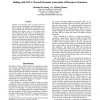Free Online Productivity Tools
i2Speak
i2Symbol
i2OCR
iTex2Img
iWeb2Print
iWeb2Shot
i2Type
iPdf2Split
iPdf2Merge
i2Bopomofo
i2Arabic
i2Style
i2Image
i2PDF
iLatex2Rtf
Sci2ools
113
click to vote
AIIDE
2008
2008
Talking with NPCs: Towards Dynamic Generation of Discourse Structures
Dialogue in commercial games is largely created by teams of writers and designers who hand-author every line of dialogue and hand-specify the dialogue structure using finite state machines or branching trees. For dialogue heavy games, such as role playing games with significant NPC interactions, or emerging genres such as interactive drama, such hand specification significantly limits the player's interaction possibilities. Decades of research on the standard pipeline architecture in natural language generation has focused on how to generate text given a specification of the communicative goals; one can imagine beginning to adapt such methods for generating the lines of dialogue for characters. But little work has been done on the problem of procedurally generating dialogue structures, that is, dynamically generating dialogue FSMs or trees (more generally, discourse managers) that accomplish communicative goals. In this paper we describe a system that uses a formalization of back...
| Added | 02 Oct 2010 |
| Updated | 02 Oct 2010 |
| Type | Conference |
| Year | 2008 |
| Where | AIIDE |
| Authors | Christina R. Strong, Michael Mateas |
Comments (0)

